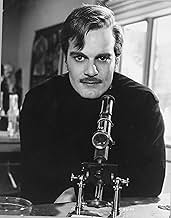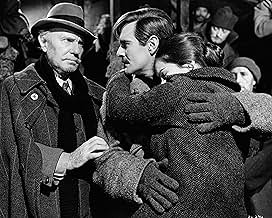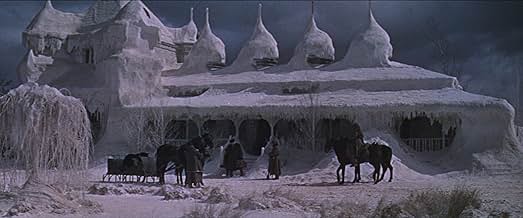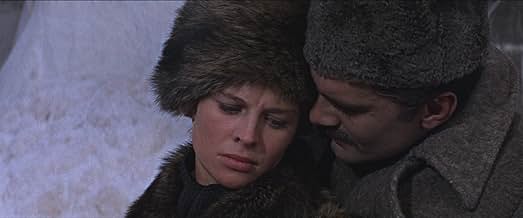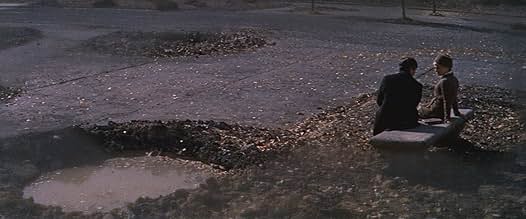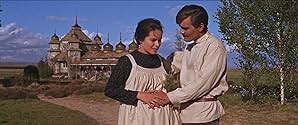Das Leben des verheirateten russischen Arztes, der sich in die Frau eines politischen Aktivisten verliebt und das Elend des Ersten Weltkriegs und der Oktoberrevolution erlebt.Das Leben des verheirateten russischen Arztes, der sich in die Frau eines politischen Aktivisten verliebt und das Elend des Ersten Weltkriegs und der Oktoberrevolution erlebt.Das Leben des verheirateten russischen Arztes, der sich in die Frau eines politischen Aktivisten verliebt und das Elend des Ersten Weltkriegs und der Oktoberrevolution erlebt.
- Regie
- Drehbuch
- Hauptbesetzung
- 5 Oscars gewonnen
- 21 Gewinne & 13 Nominierungen insgesamt
- Liberius
- (as Gerard Tichy)
Zusammenfassung
Empfohlene Bewertungen
This is a great movie. It is long. It is memorable. But it is neither a soap opera nor foolish. It is not a documentary of Russia in WW1 and then going communist. It is a life and love story against a backdrop of these things. Critics should accept what a movie is about, rather than what they wish it were about.
A movie like this, like all epics, gets a chance to show detail and immerse you in the environment. I never felt so chilled, and so bothered by the wind--all in my head--as during watching this film. In that way, actually feeling like you were there, has only been as realized for me in one other film, "The Last Picture Show", where the feel of chill and desolation in that movie is pervasive.
All performances are great, don't let the idiots tell you otherwise. I read that many felt the Sharif was wrong, or expressionless. Sorry, but that is his character. He is trying to be a professional physician, and keep the appropriate facade in the face of changes that are absolutely surreal. Christie possesses the kind of visual magnetism that makes the infatuation of Zhivago plausible. Rod Steiger, who is guilty of preposterous performances in other films, hits the keys of his performance so perfectly you never disbelieve him. Lesser actors would have just made him the perverted rapist that he is, but nothing more to add to the dynamics of his personality. Courtney as high-minded, full of foolishness, and in the end, blinded by frustration and I believe a touch of madness.
Another thing I found splendid about this film was how it illuminated how evil, twisted, and preposterous the scheme of communism truly is. In this film, and of course in history, all the wealth of the rich is removed, and redistributed. This fixes nothing. What it does allow for, in its BS concepts that all men are the same and are all "comrades", is that you don't rise due to merit, you rise because of who you know. The movie time and again shows complete idiots in charge of things...the "managers" of the old Zhivago house who have converted into mass housing for the jealous poor who hate Zhivago and his family. They couldn't be more useless. The leaders of various combat units. The guy who tells people on the disgusting train about the "features" of the accommodations. Yes, in communist countries, the cream never does rise to the top. The working class does whatever is told, just for the benefit of the scraps and their survival. Lara at one point states something like "it's a horrible time to be alive"....and nothing is closer to the truth than that.
Again, not documentary or a wartime story, but its concepts and truths are right there.
The production, of course, top notch. Watch it, take a break or two and soak it all up. It is a special kind of movie, back when they made such a thing.
"Doctor Zhivago" is definitely one of his most outstanding works, a film that breathes with life, and suffers with passion. Neither, though, of the credited people can take as much credit for it, as David Lean. Omar Sharif delivers one of his best performances of his career, Julie Christie has never been as stunning, or Rod Steiger as Komarovsky or Tom Courtenay as Antipov ever left more memorable performances than these ones. Not even Maurice Jarre, who composed one of the most unforgettable themes in film history, or Robert Bolt, for his skillful adaptation on Pasternak's difficult novel, not even Freddy Young's cinematography, can rise above the vibration of genius, which is David Lean. We almost feel the complexity of the universe collapsing on us with a mad power that we instantly become part of it, and fall in love with all its particles.
For those who haven't seen the film, this might make little sense, and it can give a misleading understanding of what one is to expect. "Doctor Zhivago" is a poet, who at the beginning of the 20th Century is caught in the historical Bolshevik revolution. An outstanding doctor, married to his childhood friend, Tonya (Geraldine Chaplin in a warm performance), finds that there is beauty beyond deceit, love beyond commitment, by starting an affair with an enigmatic lady which appears often in his path in the most unnoticeable of moments. Their destiny is as confused as Russia in the turmoil started by the Reds, it is shaped by history without their approval. There is no solution for a country that abandoned its passions in its desire of self-improvement, just as for the two lovers, which find themselves abandoned in the middle of the Siberian taiga.
This is a slow film and for the good reasons. We are allowed to breathe the story, to give it momentum, and to judge it from within, as if the choices were not Yury's, Lara's or Tonya's, but our own creation. And this is the brilliance of Lean's direction. The story transcends time and space, and it melts within the triviality of our life. Beyond it, we are left with nothing but love, pure and blindingly real.
To borrow a line from the more recent `Moulin Rouge,' this is a story bout `love.' A love story set against the backdrop of the Russian Revolution. Dr. Yuri Zhivago (Omar Sharif) is a general practitioner, but he is also a poet; through his vocation as a man of medicine, he tends to those in need in everyday real life. But it is through his avocation as a poet that he expresses what he sees. He marries Tonya (Geraldine Chaplin) and has children; but the War and revolution intervene, and it is during these tumultuous times that his life becomes inexorably intertwined with a government official, Komarovsky (Rod Steiger), a young revolutionary, Pasha (Tom Courtenay), his half-brother, Yevgraf (Alec Guinness), and finally, Lara (Julie Christie). It's desperate times for Russians from all walks of life, and Zhivago does what he can to do what he can to keep the fragile threads of his life-- and of those around him-- intact. But fate plays a hand, and in the end, even Zhivago must go where Destiny leads.
With `Zhivago,' David Lean has crafted and delivered a magnificent and monumental motion picture of epic proportions that at the same time is disarmingly intimate, rendered as a world within a world, with each a vital part of the other. Lean blends actors, cinematography, story and music with his own compassionate perspective to create a true work of art; a work of true poetry. In telling his story, he offers breathtaking visuals, like the awesome vistas of the snow-covered Urals, or a long shot of a wide open Russian plain with a solitary figure in the distance trudging through the snow, juxtaposed against the enormity of the landscape.
Often, however, what he doesn't show you, but suggests, is even more effective and emotionally stirring. Consider the scene in which a complement of mounted dragoons, sabres drawn, ride down upon a crowd peacefully demonstrating in the city streets; Lean sets it up so that you understand what is about to happen, then trains his camera on Zhivago, watching from a balcony overlooking the street as the carnage unfolds below. And in Zhivago's eyes, in the expression on his face, in his reaction to what he is witnessing, there is more horror because of what Lean has established in your imagination-- and which significantly enhances the impact of it-- than anything the most graphic visual depiction could have produced. Similarly, when the Czar and his whole family are shot, Lean does not take you there; instead, you learn of it and realize the impact of it through the reaction of Alexander Gromeko (Ralph Richardson), Tonya's father, and it places it into a context that makes it all the more effective. This is filmmaking at it's best, and an example of what makes Lean's films so memorable.
Put a talented actor into the hands of a gifted director, and results of more than some distinction can be expected; and such is the case with Omar Sharif and David Lean. In 1962, Sharif received a Best Supporting Actor nomination for his work in Lean's `Lawrence of Arabia,' and in `Zhivago,' Lean's next film, Sharif gives a sensitive, affecting performance for which he should have received a Best Actor nomination, but inexplicably, did not (It was Lee Marvin's year for `Cat Ballou'). Still, as Yuri Zhivago, he has never been better. Sharif successfully manages to convey his deepest, internalized emotions, expressing them through the genuine compassion with which he imbues his character. Lean allows his star the time he needs to share with his audience his appreciation of the beauty he perceives in the world around him, and it's in those pensive moments that we, in turn, perceive the inner beauty and poetic nature of the man. You have but to look into Zhivago's eyes to know his sense of joy in all living things. It's a wonderful collaboration between actor and director that so vividly and poignantly brings this character to life.
1965 was a career year for Julie Christie; she received the Oscar for Best Actress for her work in `Darling,' yet in this film created an even more enduring and memorable character in Lara (aided in no small part by the hauntingly lovely `Lara's Theme,' by Maurice Jarre, which indelibly etched Christie/Lara in the consciousness of `Zhivago's vast, international audience). Lara's beauty is obvious, yet of a kind that goes much deeper than what you see on the surface; her station in life has made her vulnerable to misuse, but at the same time has endowed her with a strength born of necessity. And Zhivago sees in her a quality and a resourcefulness that fulfills his romantic notions of perfection, and with a beguiling screen presence and a performance to match, Christie makes those notions credible and believable.
Guinness, Richardson and Courtenay are exceptional in their respective roles-- Lean without question knows how to get the best out of his actors-- and also turning in noteworthy performances are Siobhan McKenna (Anna), Rita Tushingham (The Girl) and Klaus Kinski, who is unforgettable as Kostoyed, manacled and designated for forced labor, yet the `Freest man on this train!' One of Lean's greatest films. 10/10.
"Doctor Zhivago" certainly pulled off a coup by showing the conditions that led to the revolution: the czar's despotic rule, the crushing poverty, and forced conscription (especially since the generals cared nothing about the men under their command). Then, of course, the Russian people thought that they would have a workers' society, but it didn't turn out that way. The theme song "Lara's Theme" kept the movie going every step of the way. Maybe not the greatest historical drama of all time, but this is a movie that I recommend to everyone.
Wusstest du schon
- WissenswertesThis movie wasn't shown in Russia until 1994.
- PatzerThe little girl who plays Tonya at Yuri's mother's funeral starts to cross herself in the Roman Catholic manner, but quickly corrects herself and finishes in the Russian Orthodox style.
- Zitate
Komarovski: Lara, I am determined to save you from a dreadful error. There are two kinds of men, and only two, and that young man is one kind. He is high-minded. He is pure. He is the kind of man that the world pretends to look up to and in fact despises. He is the kind of man who breeds unhappiness; particularly in women. Now, do you understand?
Lara: No.
Komarovski: I think you do. There's another kind. Not high-minded. Not pure. But alive. Now that your taste at this time should incline towards the juvenile is understandable. But for you to marry that boy would be a disaster. Because there's two kinds of women...
[Lara covers her ears, he forces her arms down]
Komarovski: There are two kinds of women and you - as we well know - are not the first kind.
[Lara slaps him, he slaps her back]
Komarovski: You, my dear, are a slut.
Lara: I am not!
Komarovski: We'll see.
- Alternative VersionenWhen it was first released, the film originally ran 197 minutes. Early in its run, David Lean and editor Norman Savage shortened it to 180 minutes; this version was in circulation for years. By the mid-1990s, the uncut version was restored.
- VerbindungenEdited into Hollywood: The Dream Factory (1972)
Top-Auswahl
Details
- Erscheinungsdatum
- Herkunftsländer
- Offizieller Standort
- Sprachen
- Auch bekannt als
- Doctor Zhivago
- Drehorte
- Morley Flats, Alberta, Kanada(Frozen house longshots)
- Produktionsfirmen
- Weitere beteiligte Unternehmen bei IMDbPro anzeigen
Box Office
- Budget
- 11.000.000 $ (geschätzt)
- Bruttoertrag in den USA und Kanada
- 111.721.910 $
- Weltweiter Bruttoertrag
- 112.090.394 $
- Laufzeit3 Stunden 17 Minuten
- Farbe
- Seitenverhältnis
- 2.35 : 1
Zu dieser Seite beitragen








